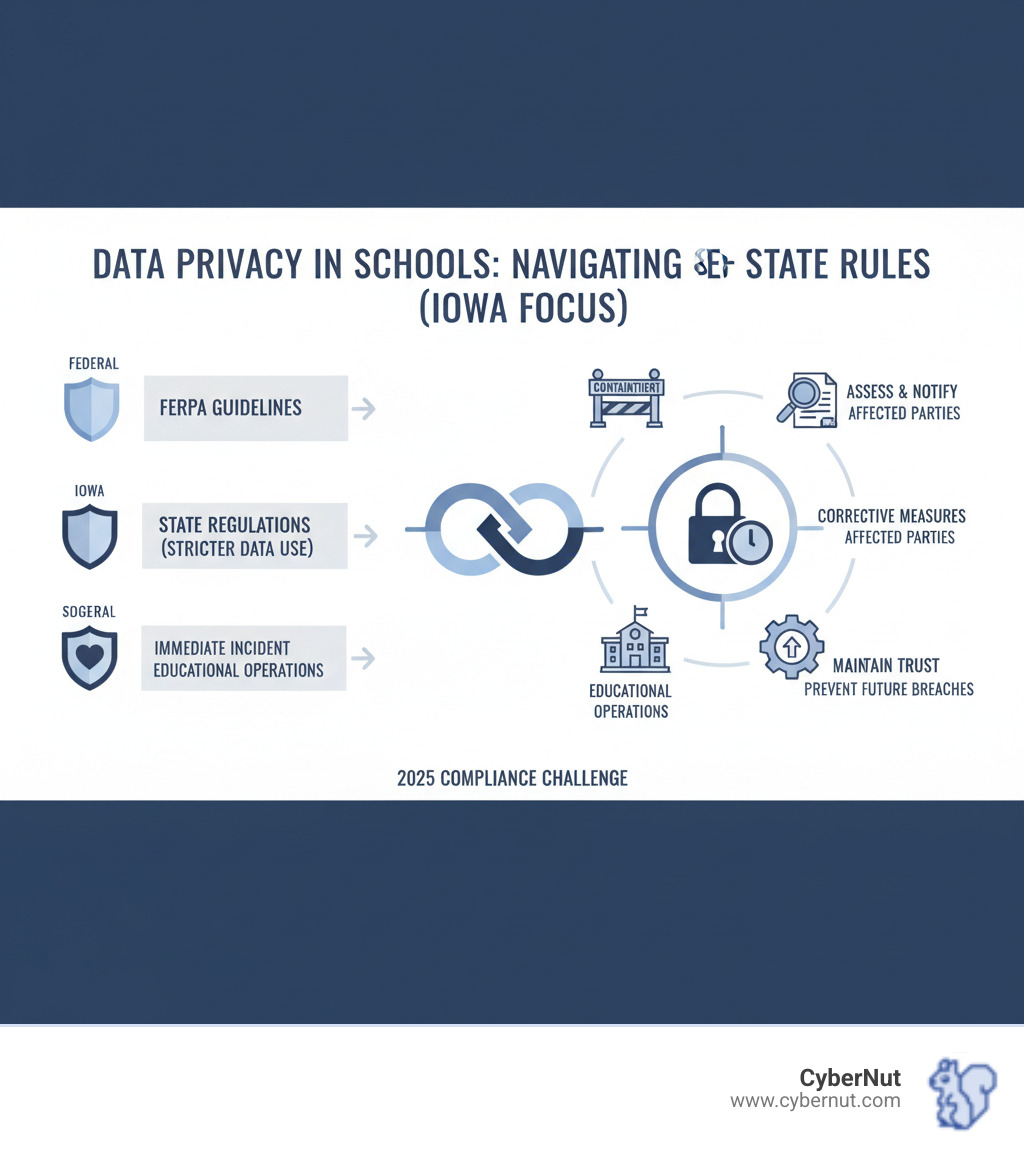
Oliver Page
Case study
October 18, 2025

Iowa K–12 schools must steer a complex legal landscape to protect student data. FERPA (state implementation emphasis) provides the federal baseline for privacy, but Iowa's Student Personal Information Protection Act (Iowa Code § 279.71) adds stricter, state-specific rules. These laws dictate how schools protect records, manage third-party vendors, and respond to data breaches.
Key compliance points include:
Since 2005, U.S. schools have suffered over 3,700 data breaches, exposing millions of records. K–12 schools are prime targets due to the valuable PII they hold—from social security numbers to health records—often without the cybersecurity budgets of other sectors.
When a breach occurs, schools must act immediately to contain the incident, assess the damage, and notify affected families. This guide provides a clear framework for Iowa schools to manage breach response, understand the legal requirements, and implement proactive measures to prevent incidents. Our goal is to help you protect student privacy, maintain compliance, and build a culture of data security.


When protecting student information, Iowa schools must follow two layers of law: the federal FERPA as a foundation and Iowa's Student Personal Information Protection Act as a modern, digital-focused addition. Understanding both is essential for maintaining compliance and building trust with families.
The Family Educational Rights and Privacy Act (FERPA) has been the cornerstone of student privacy since 1974. It applies to nearly all schools receiving funding from the U.S. Department of Education. Its main purpose is to protect the privacy of student education records and give families control over their children's information.
An education record is broadly defined as any record directly related to a student that is maintained by the school. This includes transcripts, disciplinary files, health records, and even emails about a specific student. At the heart of FERPA is personally identifiable information (PII), which includes not only a student's name or social security number but also any data that could be used to identify a student with reasonable certainty. Protecting PII is critical, as FERPA violations can lead to the loss of federal funding. For more details, visit the U.S. Department of Education's guide on The Family Educational Rights and Privacy Act (FERPA).
FERPA grants parents and eligible students (age 18 or in postsecondary education) three key rights:
While written consent is the default, FERPA includes several practical exceptions. The school official exception allows staff with a "legitimate educational interest" to access records to fulfill their professional duties. The health and safety emergencies exception permits disclosure to appropriate parties during a significant threat.
Schools can also designate certain PII as directory information (e.g., name, activities, awards) and disclose it without consent, but only after giving families annual notice and the opportunity to opt out.
Recognizing that FERPA predates the internet, Iowa enacted its Student Personal Information Protection Act (Iowa Code § 279.71) to regulate modern online services. This law targets third-party vendors that handle student data.
The core prohibitions are clear: operators of websites, apps, or online services used for K-12 purposes cannot:
Operators can use data to provide the contracted educational service, improve their platform, or comply with legal requirements. For Iowa schools, this means you must vet every edtech vendor to ensure their privacy policies and contracts align with both FERPA and Iowa's stricter state law. While most reputable vendors comply, the responsibility for verification lies with the school. You can review the full text at Iowa's student privacy law. If you're concerned about your staff's ability to spot risks, get your Phishing Audit to identify vulnerabilities.

Hoping a data breach won't happen isn't a strategy. When one occurs, your Iowa school needs a swift, organized response that complies with both FERPA (state implementation emphasis) and state law. This is your emergency playbook.
The moment you suspect a breach, your first priority is damage control.
Once you have a handle on the situation, transparent communication is legally required and ethically essential.
After stabilizing the crisis, you must fix the underlying problem and address the fallout.
A data breach is expensive and disruptive. To find your weak spots before an attacker does, consider a Phishing Audit.

The best breach response is prevention. For Iowa schools, a strong defense under FERPA (state implementation emphasis) combines smart technology, well-trained staff, and a culture of privacy.
Your technology is the foundation of your defense.
For a comprehensive technical review, use the Data Security Checklist from the Dept. of Ed..
Technology alone is not enough. With human error causing over half of student data incidents, your staff is either your strongest defense or your weakest link.
Compliance should be woven into your school's daily operations.
We know that protecting student data can feel overwhelming, especially when you're juggling everything else that comes with running a school. These are some of the questions we hear most often from Iowa educators trying to steer the intersection of FERPA (state implementation emphasis) and state privacy laws.
The moment you suspect something's wrong, your first move is containment. Act immediately to stop the breach from spreading by isolating affected systems, such as taking servers offline or disconnecting compromised computers. While doing this, you must preserve evidence like system logs for the investigation—do not wipe anything in a panic. Simultaneously, begin assessing the scope of the breach: what systems were hit, how many students are affected, and what type of PII was compromised? Fast action minimizes damage and shows regulators you are responding responsibly. To understand your risks beforehand, consider a phishing audit.
This is a question we hear a lot, and the answer is reassuring: No, FERPA does not prevent you from protecting your students during an emergency. In fact, the law specifically includes a "health or safety emergency" exception that allows you to share personally identifiable information without getting prior consent.
If there's an immediate threat to the health or safety of students or others, you can disclose relevant information from education records to appropriate parties—law enforcement, medical personnel, parents, or anyone else who needs to know to protect people. The law is designed to prioritize safety and not let bureaucratic problems get in the way during a crisis.
This is where Iowa goes significantly further than federal law, and it's something every district needs to understand when signing contracts with edtech companies. FERPA (state implementation emphasis) requires consent before sharing student data and protects personally identifiable information, but it was written in 1974—long before the explosion of educational technology tools.
Iowa's Student Personal Information Protection Act (Iowa Code § 279.71) fills that gap by specifically targeting what online service operators and vendors can do with student data. Under Iowa law, these vendors are prohibited from using student information for targeted advertising. They can't take what they learn about your students and use it to serve them ads, either on their own platform or anywhere else on the internet.
Iowa also prohibits vendors from creating student profiles for non-educational purposes. This means they can't build dossiers on your students' interests, behaviors, or characteristics to use for commercial purposes. They also can't sell student information or disclose it except for specific allowed reasons like maintaining their service, complying with legal requirements, or protecting user safety.
The practical implication? When you're vetting edtech vendors, you need to ensure your contracts explicitly prohibit these activities. It's not enough to just check the FERPA box anymore. You need to verify that vendors understand and comply with Iowa's stricter requirements. Many vendors will claim to be "FERPA compliant," but that doesn't automatically mean they meet Iowa's standards around advertising and profiling.
This dual compliance requirement—federal FERPA plus Iowa's specific vendor restrictions—is exactly why having clear policies and careful vendor vetting processes is so important for Iowa schools.
Protecting student data is an ongoing journey, not a one-time task. As this guide has shown, navigating FERPA (state implementation emphasis) and Iowa's privacy laws requires a multi-layered strategy of technology, policy, and people.
Human error is a factor in a majority of school data breaches, but the good news is that effective staff training can cut privacy violations by up to 50%. This makes your staff your most critical line of defense. When your team can spot threats like phishing attacks, they become a human firewall that protects your students' most sensitive information and saves your district from funding loss, legal fees, and reputational ruin.
At CyberNut, we specialize in strengthening that human firewall. Our cybersecurity training is built for K–12 schools, using automated, gamified micro-trainings that make learning about cybersecurity engaging and effective. We turn complex topics into practical skills that stick, all without disrupting your staff's busy schedules.
Compliance with FERPA (state implementation emphasis) and Iowa law is about honoring the trust families place in you. Don't wait for a breach to expose your vulnerabilities.
Ready to see how prepared your team is? Get your Phishing Audit today to assess your school's resilience against common cyber threats. Then, contact us to learn how CyberNut's custom training can empower your staff and secure your school community.

Oliver Page

Some more Insigths


Back